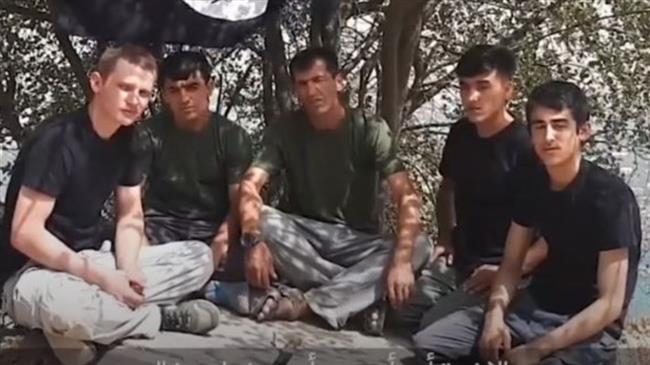Tajikistan seeks repatriation of 75 kids born to Daesh terrorists from Iraq
Tajikistan’s Foreign Minister Sirodjidin Mukhriddin says he hopes the Baghdad government will return at least 75 children, whose mothers are being held in Iraq over their membership in the Daesh Takfiri terrorist group and involvement in criminal acts in the country.
Mukhriddin said on Tuesday that of the 92 Tajik children now stranded in Iraq, 75 should be eligible for repatriation to the Central Asian country.
He went on to say that 31 of the children are aged under three.
Mukhriddin highlighted that while Iraqi legislation demands that parents consent to their children leaving the country, the kids have mostly lost their fathers as they were fighting within the ranks of Daesh and other militant groups.
Tajikistan will have to pay $400 to repatriate each child, he said, stressing that the return of the 43 women serving time in Iraqi jails would be an arduous task.
“Iraqi judges sentenced a number of female citizens of Tajikistan to long sentences, some even to life sentences. The repatriation process "will be long and hard,” Mukhriddin pointed out.
He concluded that Tajik diplomats will be heading to Syria “in the near future” to discuss the repatriation of former militants to their country.
On February 8 last year, Tajikistan pardoned more than 100 people, who had returned home from Iraq and Syria after fighting along the ranks of Daesh and other Takfiri terrorist groups.
Tajikistan’s Interior Minister Ramazon Rahimzoda said the returnees could resume their normal lives in the country based on a 2015 government decree for clemency.
“Regarding the fate of 111 Tajik citizens who returned from Syria and Iraq voluntarily, all of them are free under Tajik law,” Rahimzoda told a news conference in the Tajik capital Dushanbe.
Tajik authorities have said over 1,000 citizens left the country to fight on the side of militant groups in Iraq and Syria after 2011. Most of the recruits had traveled to those countries via Russia, where an estimated one million Tajiks live and work.
The most famous Daesh recruit from Tajikistan was Colonel Gulmurod Khalimov, the head of the Tajikistan special forces unit known as Omon.
On May 30, 2015, American officials confirmed that Khalimov had defected to Daesh. He was known for a while as Daesh’s “minister of war.”

Russia’s Defense Ministry reported on September 8, 2017 that its fighter jets had killed him during an operation in Syria’s embattled eastern city of Dayr al-Zawr.
The poor economic situation in Tajikistan and its adjacency to Afghanistan has made the country, a former Soviet republic, a prime ground for homegrown militancy over the past years.
Former Iraqi Prime Minister Haider al-Abadi declared the end of military operations against Daesh in the country on December 9, 2017.
On July 10 that year, he had formally declared victory over Daesh in Mosul, which served as the terrorists’ main urban stronghold in Iraq.
In the run-up to Mosul's liberation, Iraqi army soldiers and volunteer Hashd al-Sha’abi fighters had made sweeping gains against Daesh.
Iraqi forces took control of eastern Mosul in January 2017 after 100 days of fighting, and launched the battle in the west on February 19 last year.
Daesh began a terror campaign in Iraq in 2014, overrunning vast swathes in lightning attacks.
D-8’s role in Iran’s economy after Cairo summit
China slams US as ‘war-addicted’ threat to global security
China ‘firmly opposes’ US military aid to Taiwan
VIDEO | Press TV's News Headlines
President Yoon Suk Yeol to be removed from office
At least 19 Gazans killed by Israeli airstrikes since dawn: Medics
Leader: Iran neither has nor needs proxy forces
US fighter aircraft shot down ‘in friendly fire’ amid aggression on Yemen

















 This makes it easy to access the Press TV website
This makes it easy to access the Press TV website